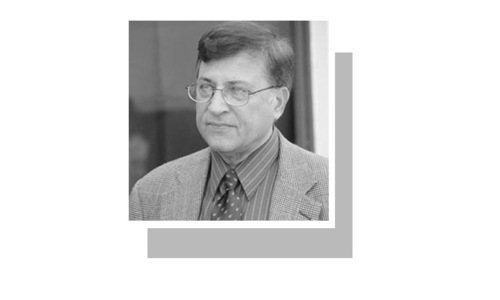WASHINGTON: The US narrative of Pakistan’s role in war against terrorism does not reflect the rapidly changing realities on the ground, says the country’s US envoy Aizaz Ahmed Chaudhary.
Read: 'US asks Pakistan to do more yet fails to compensate'
In his address to the World Affairs Council, Mr Chaudhary also said that China-Pakistan Economic Corridor (CPEC) should not affect relations between the United States and Pakistan and asked Afghanistan to take advantage of this opportunity as its first beneficiary.
“It’s mainly in the economic domain that we want better relations with the United States,” said the ambassador. “We are getting positive vibes from the Trump administration. There are areas on which we can work. We understand that this relationship can be beneficial to both.”
Mr Chaudhary said Pakistan understood the US desire to enhance its military presence in Afghanistan aimed at strengthening the Afghan security forces was “well-meaning” but blaming Pakistan for everything that happened in Afghanistan was wrong. “Afghanistan’s problems cannot be resolved by blaming a bad guy called Pakistan. It will not work,” he said.
“The US narrative does not reflect the rapidly changing realities in Pakistan,” the ambassador said in his opening remarks. “No one supports the so-called holy war anymore, not even the so-called right wing parties.”
Mr Chaudhary said this narrative changed when terrorists started attacking schools and places of worship and killing innocent civilians. “The war is no more holy when you kill women and children,” he added. “Now, there is a national consensus against these extremists in Pakistan. But this consensus does not reflect in the US narrative.”
The Monday night meeting was the ambassador’s first at the council and comes at a time when the Trump administration is busy finalising a new Afghan policy aimed at defeating insurgency in Afghanistan.
Ambassador Chaudhary said that Pakistan had shared a four-point proposal with the United States on this issue: (1) there’s no military solution to the Afghan conflict (2) need for a political strategy that clearly defined the role of the Taliban (3) talks with the insurgents (4) better border management between Pakistan and Afghanistan.
He said that security was the main issue between the two long-time allies. “We are ready to work with the US to remove the misunderstanding that piled up over the years.”
Replying to a question about Osama bin Laden’s presence in Abbottabad, he said: “OBL was not Pakistan’s creation. We did not like him a bit. We are happy that he got killed. But we are not happy with the way he was killed. This is not how you deal with allies.” He said that had the Americans informed Pakistan, the results would have been the same as Pakistan too wanted to get rid of him.
Pak-India ties
Mr Chaudhary stressed the need for better relations between India and Pakistan, saying that New Delhi played into the hands of the terrorists when it cancelled bilateral talks after an attack. “The answer to such attacks is more, not less, talks,” he said.
Mr Chaudhary said that after successfully curbing terrorism inside the country, Pakistan is now seeking to consolidate its economy and companies from across the world had responded positively.
“We have American companies too. In some places, you can see the Chinese capital and Pakistani labour working together to install GE turbines to produce electricity,” he said. GE is an American company.
The envoy said that since Pakistan was focused on improving its economy, it could not afford to have troubles on its borders and that’s why it was seeking friendly ties with both Afghanistan and India.
“We know that if there’s trouble and instability in Afghanistan, there cannot be stability and peace in Pakistan,” he said, pointing out while that unrest in Afghanistan was preventing Pakistan and other South Asian countries from acquiring electricity and gas from the energy-rich Central Asia.
For the same reasons, Pakistan also wanted to improve its relations with India and was always willing to hold talks with New Delhi. “But we want a relationship based on equality and mutual respect. Hegemony is not acceptable,” he said.
The ambassador disagreed with the suggestion that the Pakistani military was supporting insurgents in Afghanistan. “The people, the government and all its institutions, including the army, have a genuine interest in stabilising Afghanistan,” he said.
Mr Chaudhary said that while Afghanistan blamed Pakistan for allowing terrorists to carry out attacks inside their territory, Islamabad had similar complaints against Kabul.
“So, a better management of the border and better coordination between the two governments is the only option for ending this blame game,” he said.
Published in Dawn, May 17th, 2017














































